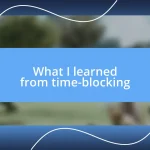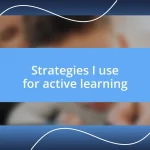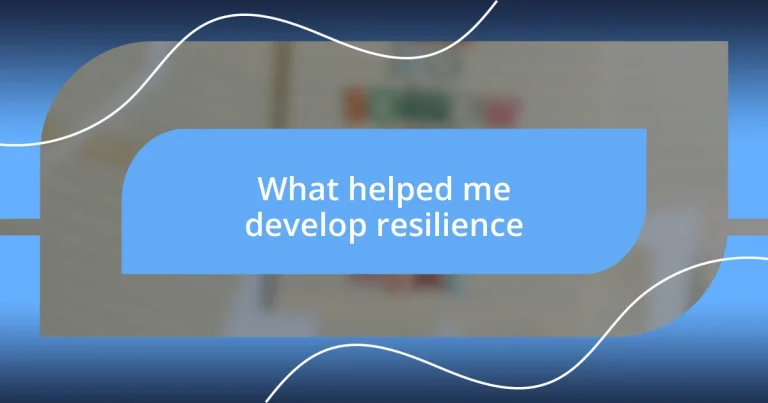Key takeaways:
- Resilience is a skill developed through challenges, emphasizing growth from experiences rather than merely bouncing back.
- Supportive networks and emotional connections play a crucial role in fostering resilience during tough times.
- Embracing daily practices like mindfulness, journaling, and physical activity enhances mental toughness and overall resilience.
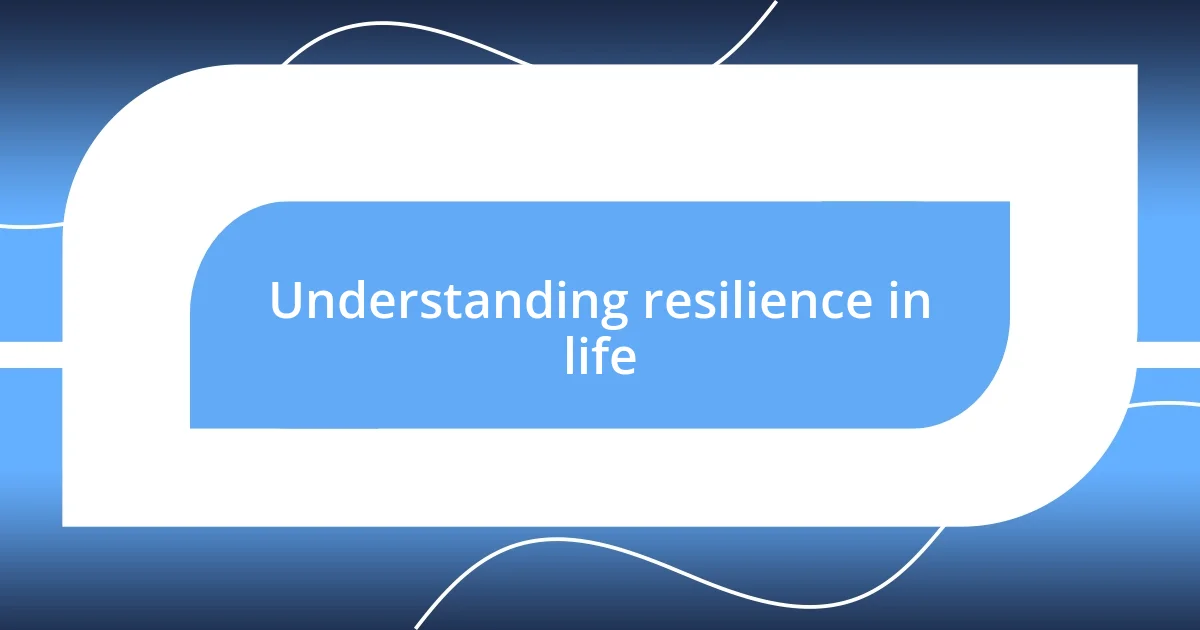
Understanding resilience in life
Resilience, for me, is more than just bouncing back from tough times; it’s about growing from those experiences. I remember a particularly challenging period in my career when I faced criticism that felt personal. Instead of dwelling on the negativity, I asked myself, “What can I learn from this?” This shift in perspective transformed my approach to setbacks.
Understanding resilience means recognizing that it’s not a fixed trait but a skill that can be developed over time. I often reflect on how every challenge I’ve faced, whether in relationships or work, has taught me something valuable. Have you ever noticed how some of your toughest experiences have shaped your character? I think it’s fascinating how these moments can bring about a greater sense of purpose and strength.
Emotional wisdom plays a key role in resilience, too. I vividly recall times when I allowed myself to feel the weight of disappointment or grief instead of rushing to suppress those feelings. This process of embracing emotions, rather than avoiding them, has been vital in building my resilience. Isn’t it intriguing how accepting vulnerability may actually lead to a stronger, more resilient self?
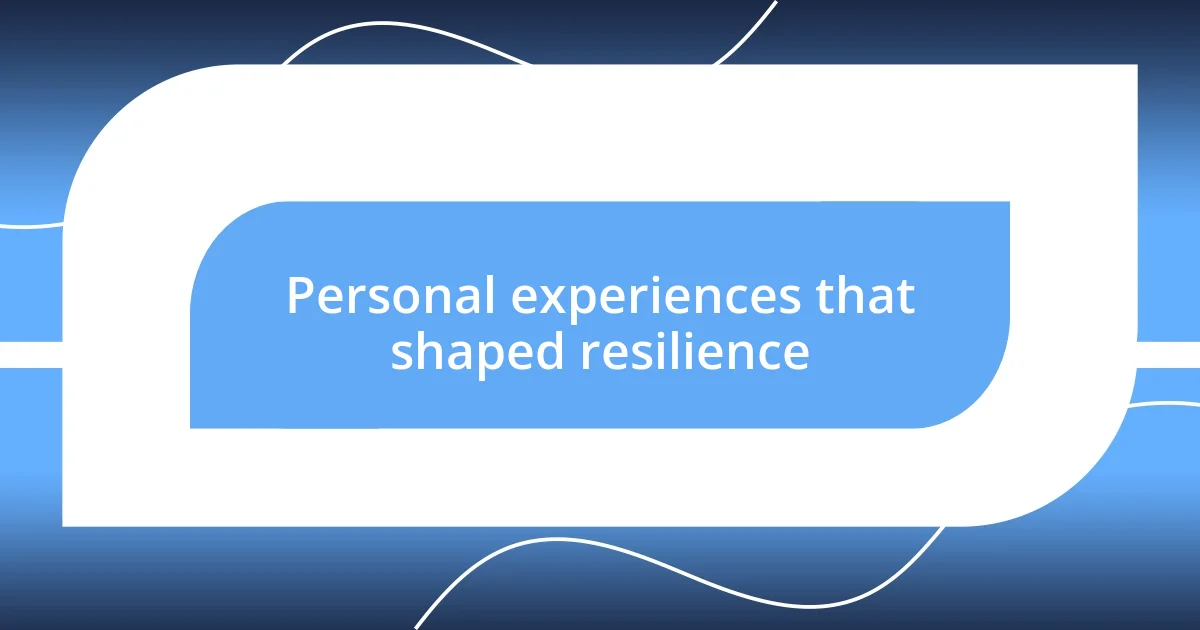
Personal experiences that shaped resilience
I have always believed that personal experiences shape who we are, especially when it comes to resilience. There was a time in college when I faced academic challenges that felt insurmountable. I remember sitting alone in my room, overwhelmed by the weight of expectations. Instead of surrendering to frustration, I sought support from friends and professors, which taught me the significance of community in navigating tough situations. That experience instilled in me the understanding that reaching out for help can turn obstacles into opportunities for growth.
Reflecting on my journey, I can pinpoint several key moments that contributed to my resilience:
- Loss of a loved one: Experiencing grief taught me to cherish connections and the importance of expressing emotions.
- Job rejections: Each “no” was a lesson on perseverance and motivated me to refine my skills and approach.
- Moving to a new city: The initial loneliness forced me to step out of my comfort zone, fostering adaptability and social courage.
Each of these experiences reinforced my belief that resilience isn’t just about enduring but also about evolving in the face of challenges.
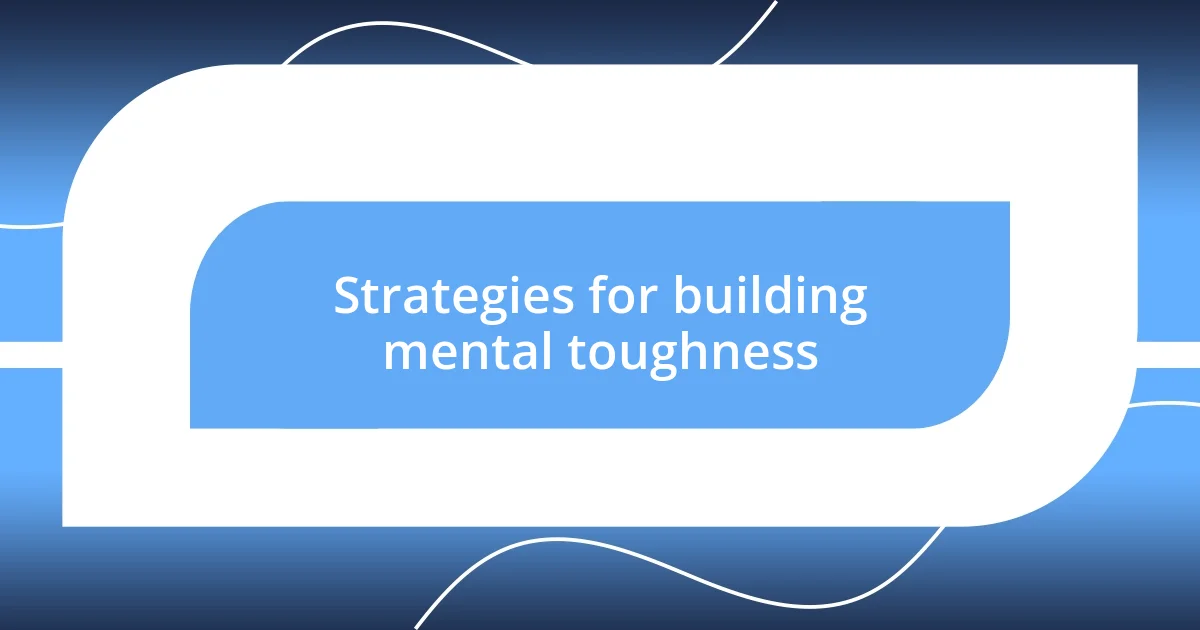
Strategies for building mental toughness
Building mental toughness has been a journey for me, and I’ve discovered that several strategies significantly contribute to this strength. One method I’ve found effective is setting small, achievable goals. For instance, during a particularly demanding project, I broke down my tasks into manageable steps. This not only helped combat overwhelm but also provided me with small wins that boosted my confidence along the way. Have you ever tried this? It’s amazing how celebrating these little victories can elevate your mental state.
In addition, cultivating a positive mindset has been crucial in my development of mental toughness. I recall a time when I faced multiple setbacks in my personal life; instead of focusing solely on the negatives, I made a conscious effort to find the silver lining in every situation. Embracing gratitude and looking for lessons in my challenges shifted my focus from what I had lost to what I could gain. This change in perspective not only nurtured resilience but also enriched my overall outlook on life.
Lastly, I believe that practicing mindfulness has significantly strengthened my mental resilience. There were moments when I felt consumed by anxiety about the future; during those times, meditation provided me with the clarity I needed. By grounding myself in the present, I learned to respond instead of react to stressors. Adopting mindfulness practices helped me develop emotional regulation skills, making it easier to navigate life’s ups and downs with a calmer demeanor. Have you tried mindfulness in your own life? I sincerely recommend giving it a chance if you haven’t.
| Strategy | Description |
|---|---|
| Setting Small Goals | Breaking tasks into smaller steps can reduce overwhelm and provide a sense of achievement. |
| Cultivating a Positive Mindset | Focusing on gratitude and finding lessons in challenges can transform your perspective on adversity. |
| Practicing Mindfulness | Meditation and being present can help manage anxiety and enhance emotional regulation. |
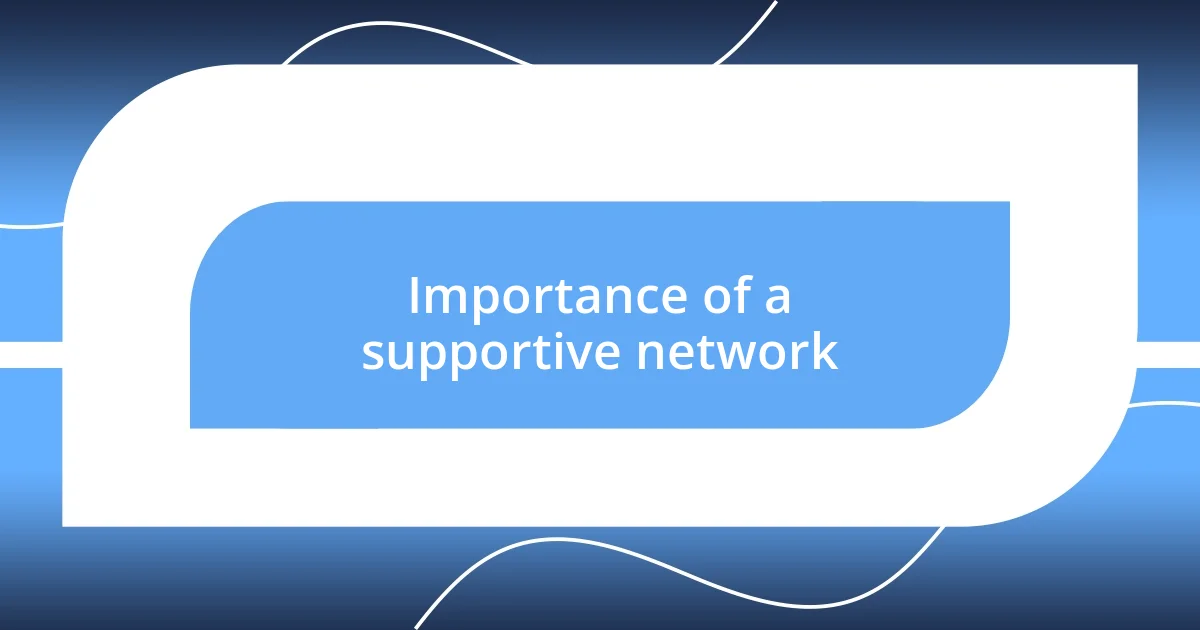
Importance of a supportive network
Having a supportive network is vital when it comes to building resilience. I vividly recall a particularly tough time in my early career when I felt completely overwhelmed. My colleagues rallied around me, offering encouragement and advice, which not only bolstered my confidence but also reminded me that I wasn’t alone in my struggles. Have you ever had someone step in right when you needed it most? Those moments can stick with you and truly shape your ability to bounce back.
Each connection within your network can provide unique perspectives and resources. There was a time when my family became my anchor during a personal crisis, proving that support often comes from unexpected places. Their willingness to listen and share their experiences gave me new insights into coping with my challenges. It’s like having a safety net that you don’t see until you need it, but when you do, it makes all the difference.
The emotional support from friends and family can also foster a sense of belonging that fuels resilience. I remember sitting with a close friend over coffee, discussing our fears and aspirations. Just being heard lifted a weight off my shoulders, reinforcing the idea that sharing vulnerabilities is powerful. Do you ever find solace in sharing your struggles with someone you trust? It’s remarkable how opening up can strengthen not just your resolve but your bonds with others.
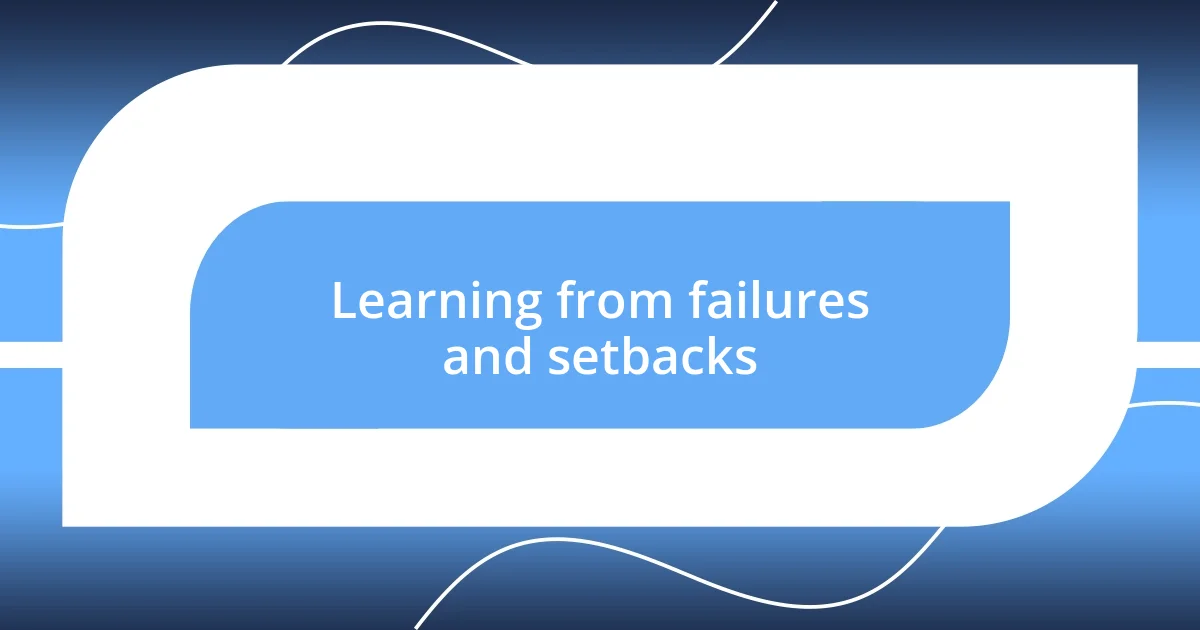
Learning from failures and setbacks
Experiencing failure can feel like a heavy blow, but it’s often within these moments that I find my greatest lessons. I distinctly remember failing an important exam early in my academic career. At first, the sting was sharp, tugging at my confidence. However, instead of letting that defeat define me, I took a step back and analyzed my approach. What did I miss? What could I do differently? This reflection led to a more effective study strategy, and eventually, a better outcome. Failures can be brutal teachers, but they have a unique way of lighting the path forward.
Setbacks can be disheartening, and I’ve certainly felt that disappointment. One memorable incident was when I launched a project that I believed would soar, only for it to crumble unexpectedly. It was tempting to cast blame outward or wallow in self-pity. Instead, I chose to gather feedback and assess what went wrong. I discovered gaps in my preparation and communication that I could improve upon. The experience made me more resilient, emphasizing the importance of assessing failures not as endings, but as stepping stones for future success. Have you experienced something similar?
When I reflect on my journey, each setback reveals an opportunity for growth—an invitation to refine my skills and understanding. Just last year, when faced with a personal challenge, I found myself grappling with my emotions, often feeling lost in the chaos. By embracing the discomfort and leaning into it, I gained insights that reshaped my approach to resilience. It’s like a puzzle where each piece feels misaligned at first, yet once I embraced the challenge, the picture began to clear. Learning from failures isn’t just about fixing mistakes; it’s about evolving into a more adaptable version of yourself. How have your experiences shaped who you are today?
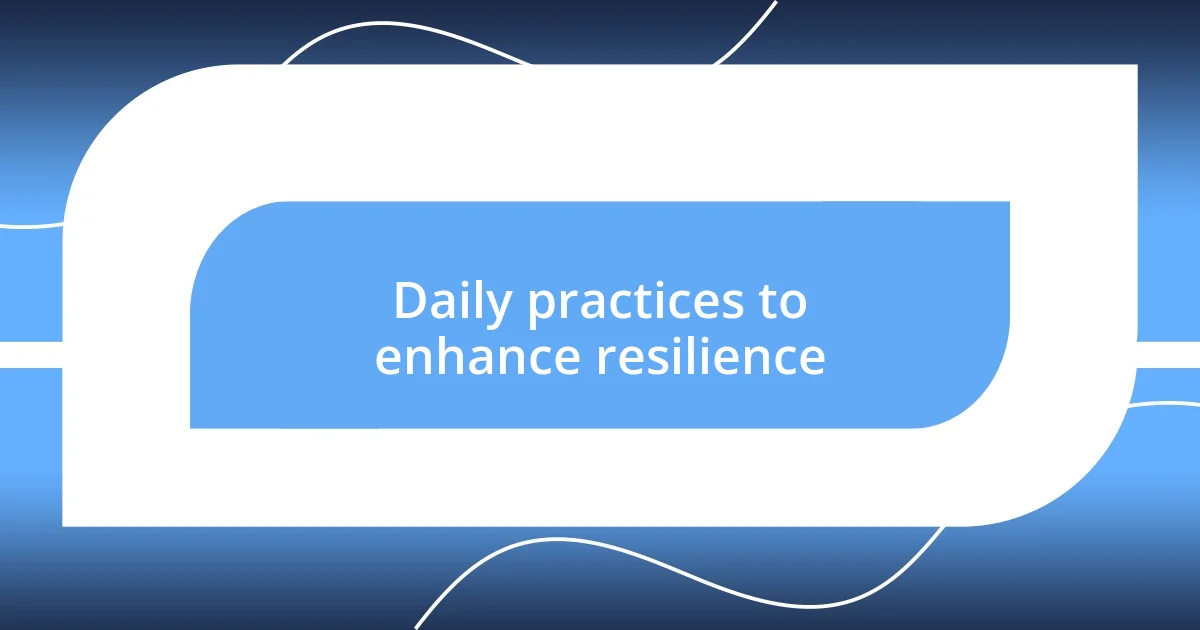
Daily practices to enhance resilience
Daily practices can significantly bolster resilience, and I’ve found that mindfulness plays a transformative role in my life. By dedicating just ten minutes each morning to meditation, I create a calm space where I can reflect on my thoughts and feelings without judgment. One day, I remember feeling particularly anxious about an upcoming event. In that moment of stillness, I was able to acknowledge my fear, which somehow lightened its grip on me. Have you ever noticed how just stepping back can provide clarity?
Another practice that has proven invaluable is journaling. I started writing down my experiences and emotions during tough times, and it has become a safe outlet for processing my challenges. On one particularly hard day, putting pen to paper allowed me to release pent-up frustration and gain perspective on the situation. It felt like having a conversation with myself, and I often ended up discovering solutions I hadn’t considered. Do you think journaling could offer you a fresh lens on your own struggles?
Physical activity is also a cornerstone of my resilience-building routine. I learned that a simple walk in nature can work wonders for my mental clarity. I recall a rainy day when I reluctantly went on my usual run, feeling heavy-hearted. By the end of the workout, I found myself reflecting on my problems in a new light. Exercise provides an opportunity to reset and recharge, reminding me that sometimes a shift in my physical state can lead to a shift in mindset. Have you ever felt the power of movement in lifting your spirits?
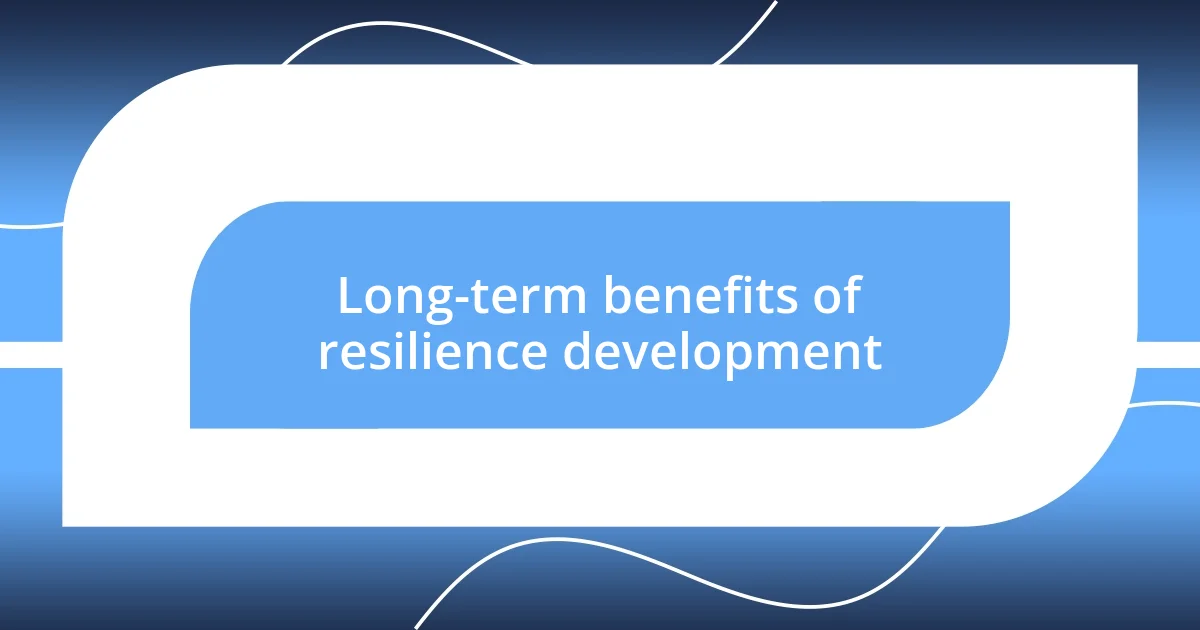
Long-term benefits of resilience development
Resilience development reaps long-term benefits that often surprise you. For instance, I remember facing challenging situations at work that once made me feel overwhelmed. Over time, I realized that these experiences sharpened my problem-solving skills and boosted my confidence. What initially felt like stress transformed into a solid foundation, making future challenges appear less daunting. Isn’t it fascinating how discomfort can lay the groundwork for strength?
I also noticed that building resilience enhanced my relationships. When I encountered conflict with friends, I learned to communicate my feelings rather than retreating into silence. One memorable disagreement left me feeling vulnerable, but instead of shutting down, I chose to express my perspective openly. This not only deepened my connection with that friend but also fostered a climate of trust and understanding. Have you ever experienced a moment when vulnerability strengthened a bond?
Ultimately, resilience fosters an optimistic outlook on life. I recall a period when I faced multiple setbacks, feeling as if the universe was conspiring against me. Instead of wallowing in negativity, I started to shift my mindset. I focused on gratitude for the small victories and lessons. As a result, I began to see each obstacle as an opportunity for growth. Does it surprise you how a change in perspective can transform your entire experience?






